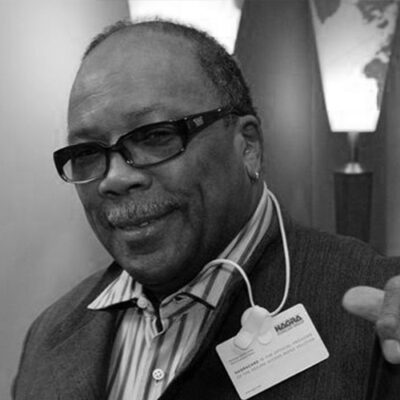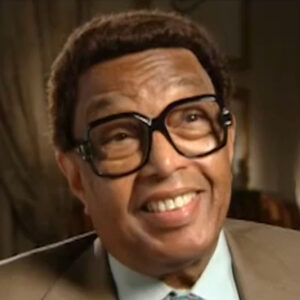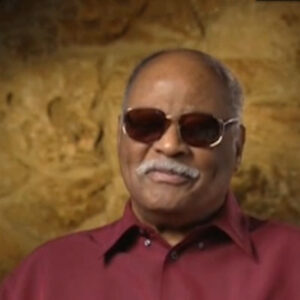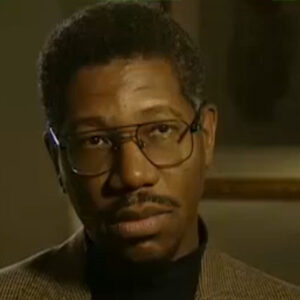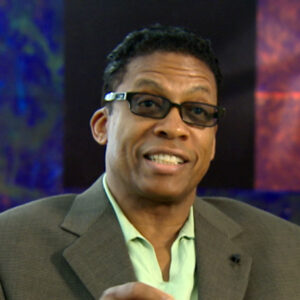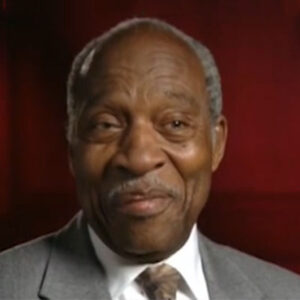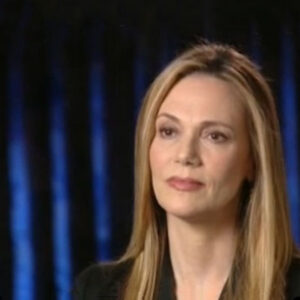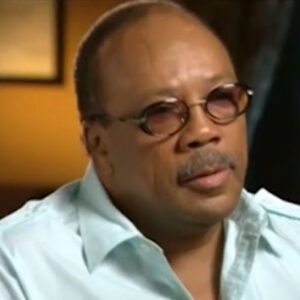Speaker Quincy Jones has lived so much of jazz for the last 50 years that coming out of BBR, the big bands, the fusion of jazz with R&D and rock and pop, working with Miles Davis. He encapsulates so much of the history of jazz in the last 50 years. He’s one of those singular figures who has such a marvelous grounding in jazz and has gone on to do so many other things that he has a commanding role in the popular culture.
Speaker He has a commanding position in the popular culture where just about everybody’s heard of Quincy Jones. People have a lot of respect and they listen when he says something.
Speaker Right. What about that? Think we should get a little. Our job is just we don’t want to look like Nixon.
Speaker Yeah. Yeah.
Speaker And my my sweetheart put up, you know, jazz no matter what Quincy doing. It’s like.
Speaker He has a. Not extra quiet. What’s it called a. It’s really important to him that. That his jazz underpinnings, which obviously. Carl, his work are.
Speaker Understood and brought. You know what? Why is, I guess, proselytizer? That’s the word Quincy’s a jazz proselytizer. Why and how does he promote Jack?
Speaker I think you should ask him that question for the best answer. But.
Speaker Oh, OK. Clearly, he’s out in the world doing this stuff.
Speaker Quincy’s first love is jazz. And then that has remained a core of his being throughout his life. He likes to say that it was people like Count Basie that became his family. And Clark Terry was a mentor.
Speaker And these figures are far more than teachers or mentors. There they’re part of his very core, his very being. And he’s never forgotten that. And I think he feels a tremendous debt to these giants that he walked with, worked with, played with. And he will find all sorts of means to get his love of jazz out to the people. We’re thrilled that he’s helping the Smithsonian to launch Jazz Appreciation Month, an annual jazz month. And that portends a lot of good things for the music and for the country.
Speaker So, Michael, just move one inch or two inches to your right. That me.
Speaker Yeah, yeah, yeah. He’s always trying to make people look better.
Speaker That’s a great cameraman, perfect moment to continue.
Speaker That’s great work. Help us, if you would understand. Quincy Borden, 33. He comes up in an era where jazz occupies a spot in music and popular culture spectrum that it doesn’t any longer. Speak to, you know, the world when she’s a teenager, the world he enters just jazz, his pop music.
Speaker When Quincy started listening to music as a young boy, Jazz was America’s popular music. Big bands were still the mainstay of popular music.
Speaker And it was only with the end of World War Two that you had the rise of big singers and R&D and jazz became less America’s pop of music. But still, there was an awful lot of jazz to be heard. And it was that kind of music that that grabbed him and and seized his musical soul.
Speaker I think we know I should say, let’s just be frank right now. That was perfect. Well, that’s that’s a good refrain. There’s a moment where, you know, he has this freedom tour suffers major financial. Right. Fifty nine. And shortly thereafter, he sort of. Begins working in pop music and. I don’t want to signal that is the end of a jazz era. But point two, if you would, how within again how music tastes were changing and how Quincy sort of wrote different waves.
Speaker In the 1960s, there was a tremendous sea change in American music with the arrival of the Beatles, the. The rock and roll, which had started some decade music that again, I love.
Speaker You mentioned the Beatles. OK, sure, sure.
Speaker In the 1960s was starting.
Speaker Rock and roll came in the 1950s and 1960s. There was an even bigger sea change when the Beatles came in and absolutely transformed American pop music and jazz was under a great deal of threat, if you will, from the music. It was siphoning off the young people who in previous generations had glommed on to jazz. And so you had people like Miles Davis looking for a middle way between the two musics with albums like In a Silent Way and Bitches Brew. And perhaps Quincy Jones was looking to hang on to that youthful audience with albums like Walking in Space, which I discovered as a college student and and played practically the grooves out of.
Speaker Yeah. Quincy goes to Hollywood, but emerges. Let’s talk about that.
Speaker That period where I guess Herbie Hancock is one of the pioneers. Quincy is sort of jazz fusion. There’s a moment in the 70s where after Quincy has this aneurysm, he decides he wants to make. The walking space out the X Y in space is a little bit earlier, but he was back water, Jack.
Speaker You got it.
Speaker Bad girl ha mellow. Now he wants to take Jagt his jazz underpinnings, but really bring them to a rock infused.
Speaker Well, not a little bit more from Quixey perspective. He has this background and very few others have at that point. He’s infusing his music with.
Speaker Quincy found a way to merge jazz soloists and jazz compositions with electric instrumentation and a A hip R and B Sensibility and pop singers in these albums and found a new audience for himself and led the way, pointed the way to other kinds of fusions of jazz with pop music, such as you found in, say, weather report.
Speaker Well, the report also grew out of Miles Davis. But I think you could point to Quincy Jones work as a as a predecessor of that as well.
Speaker So while I listen to think just like two days ago.
Speaker I mean, look at my questions. Wait. What’s she’s so multifaceted, what do you think his greatest contribution to our culture?
Speaker That is a tough question.
Speaker All right. That’s why he’s doing it. This is everybody. Another tough question.
Speaker Who is Quincy Jones?
Speaker Quincy Jones is one of a kind. To use Duke Ellington’s phrase, he is truly beyond category.
Speaker He has strode atop so many different mountains as a composer, bandleader, arranger, as a pioneering African-American writer of scores from motion pictures and television, as a synthesizer of various musics, as a tremendously successful record producer, as a pioneering African-American executive in the record industry, as a pioneering owner of broadcasting stations, as a as a movie producer, as a businessman, as a social activist. He has so many different facets to him. He’s like a diamond that you hold up to the light. You look at it this way. You see one dimension. You look at it this way, you see another. He’s all those things rolled up into one.
Speaker That was great. Somehow it’s easier to strike. By trying to get all those bad. Pick one particular angle that that’s part of it is maybe you personally learned from Quincy and it doesn’t have to be like I learned about some music. We all have these little individual moments or brushes. Maybe it’s a dirty joke. I don’t know. You know what part one person. How does Quincy inspire you or what’s the. What’s the.
Speaker Thing, you just.
Speaker What I find personally inspiring about Quincy Jones is his extraordinary commitment to excellence. His willingness to think outside the box and break down barriers and and be beyond category and the fact that he’s proven you can be excellent in more than one area. He’s he’s really a Renaissance man. I think that’s all very inspiring.
Speaker And. Help us frame, if you will. You know, this this context is monosodium.
Speaker Would you say Quincy is is at home in. And archival institution such as the Smithsonian, as he is out on the street you street in 13. You know, we interviewed Bill Clinton three days ago or, you know, give us a sense of place.
Speaker You did. Yes. Really about Quincy?
Speaker Yes. I’ll tell you about that sampan place, if you would, how you bringing me here? But within the context that he’s just as comfortable addressing the crowd that he did in this room yesterday as he is in, you can pick any other number of. Sure. OK. That might be a great way for us to then feed into one of the events here. OK.
Speaker Quincy Jones is a man for all citizens. He’s just as comfortable talking to the guy on the corner as the president of the United States. Just as comfortable addressing a group of people in jeans as a group of people in tuxedos, just as comfortable talking to a museum curator or a senator or congressman. He is he he’s himself. He’s so authentic. He’s just himself in every situation. And that’s really refreshing.
Speaker That is so true. That’s why I was like, he is comfortable with me as he is with you and Bill Clinton.
Speaker Drove me to do that answer again. Yeah.
Speaker I mean, you even put the museum curator long enough so that we can bring up museum.
Speaker Well, I was thinking what I maybe should have said is somehow introduce the Smithsonian. And he’s because that was first part of your question time.
Speaker And you know what? We hear this, right? Yeah.
Speaker Here at the Smithsonian, we’ve made a great point of preserving America’s jazz legacy. And that’s Duke Ellington. That’s Ella Fitzgerald. That’s Lionel Hampton. That’s Benny Carter. All people that Quincy was close to. And of course, Quincy belongs in the Smithsonian. We hope to have the honor of preserving his archive someday. But meanwhile, we’re doing things like honoring him with these concerts of the Smithsonian Jazz Masterworks Orchestra and working with him to establish the National Jazz Smith Jazz Appreciation Month.
Speaker Great. I’m realizing we might try and do a little.
Speaker That’s cut from one side.
Speaker Ready? You’re.
Speaker Quincy Jones has big ears. He listens to Dizzy Gillespie or Charlie Parker. He listens to Duke Ellington or Gil Evans. He listens to Miles Davis or Benny Goodman or Benny Carter. And he finds a way to pull out the pieces of each of those individuals that that feel right for him and make his music his own.
Speaker Perfect. Like, I could just see working through the hearing to connect the dots. Yeah. For one sec.
Speaker I mean, I haven’t been out to see any of his stuff. So that’s that’s a that’s a tough question. I mean, you know, with Pat Boone, whom I met on a plane recently, it’s you know, it’s probably the trademark white shoes with, you know, B.B. King would be one of his Lucille guitars.
Speaker Let’s do that as a way of trying to describe it. Yeah.
Speaker If there was one thing the Smithsonian would represent Dizzy Gillespie with its his angled bell trumpet, which we have on display, if we represented B.B. King with one thing, it would be we would we would want it to be one of his Lucille guitars, Pat Boone. Probably a pair of his trademark white shoes with Quincy Jones. He’s so multi-dimensional. There is no one thing that’s solely emblematic of him. We would want to put up some scores. We would want to put up some things from his movie work. We would want to put up some some of his albums, perhaps some representation of his many travels abroad. He is so multidimensional. Something from Thriller. We were working looking at his his work in American music as a whole, something from Thriller. If we were looking at his work in American music as a whole, he’s so broad.
Speaker Jimmy, do that again. Sure. OK.
Speaker I think we have just a couple of minutes. OK. No, it’s still it’s about.
Speaker Started here at the Smithsonian to represent, say, Dizzy Gillespie. We’d want his angled bell trumpet, which we have on display if we were to represent B.B. King with one artifact. It would be his Lucille guitar. If it were Pat Boone, it would probably be his trademark white shoes with Quincy Jones. There is no clear answer. There is no one artifact that I think could summarize. Quincy Jones, because he was and is so multidimensional.
Speaker Perfect. I think we’re good. I, uh, me just double check my question. Shocked you were. As you ever had to take on.
Speaker On jazz or, you know, something where you just go into thinking outside the box. That really is outside the box.
Speaker Well, it was a great forward I. Nothing shocked me. I think he really hit encapsulated jazz. And his feelings about it beautifully. I mean, just really beautifully in under a page. I mean, I could I could take a quick look and quote something if you want me to.

